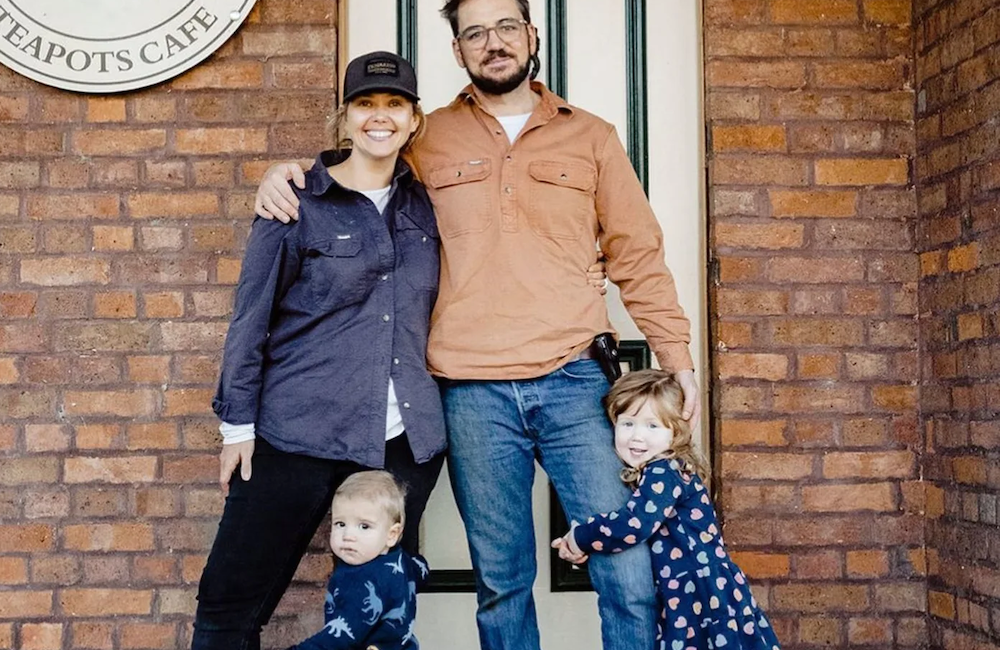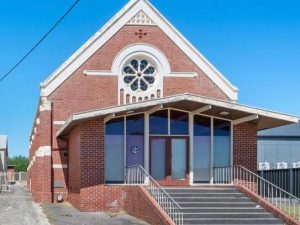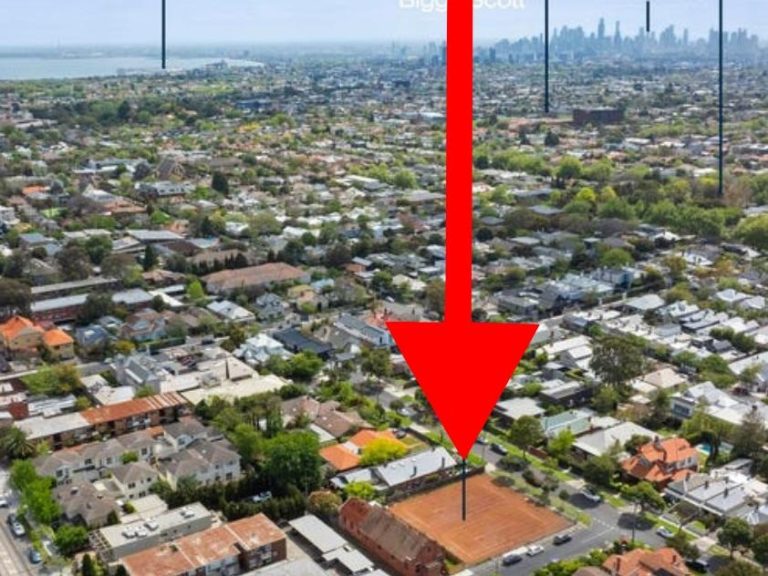“We’ve been blown away by the interest in the project so far, and obviously, having a profile and being involved with a show like Sunrise generates interest.”

In December 1930, the hotel was known as Stoke House, and serviced a town of about 3000 people. Today, just 304 people call Carcoar home. Picture: Supplied.
Saltash Farm’s name has been derived from the title of the land grant given by stockbreeder Thomas Icely to his daughter in the 1850s.
“Like any renovation and building project, there are various ups and downs,” Bartholomew said.
“We decided on one name and then the history was a little bit questionable.
“And so we’ve rebranded and chosen a new name. So, there’s lovely history still and it’s probably more of a unique name. Like many of these things you end up in a better spot than when you started.”
She admits the “the joys of building something from scratch” has had its unexpected “twists and turns” but the dream they first envisioned for the project, for the most part, still remained.
“Thankfully, a lot of our team has been fantastic because our very clear ideas from the get go have been very much on the same page as them,” she said.

Under every surface, Edwina and family are discovering hidden features. Picture: Supplied.
“Even when we saw the property for sale and we saw the land and the potential, we had a very good and clear idea of what we thought we could build there and wanted to do.”
Changes to their plans have been necessary along the way due to the fact that Saltash Farm belongs to a heritage protected town.
“Since the 1970s, the whole town has been under fairly strict heritage guidelines for a reason because that’s what attracted us to it, its beautiful history and the beautiful buildings and the kind of intact and very well-maintained main street façade,” she explained.

Under the watchful eye of the family, work has begun to transform the property into Saltash Farm. Picture: Supplied.
“We wanted to make sure that we did the same through our project, but obviously that means you need to work within heritage guidelines, within heritage colours.”
This includes limits to changing the original building’s structure, and keeping the roof the same Colorbond red manor hue, in addition to regulations that come with running a commercial business.
“We certainly went in with rose coloured glasses and it’s been a complicated process, even the planning aspect,” she said.

Edwina and Neil take a peek into the cellar, which features a 10ft ceiling and the original keg rail. It took Neil a week to clean it out. Picture: Supplied.
“We are genuinely loving every minute of it. It’s been a crazy ride thus far.”
With hopes to be up and running by autumn 2025, Bartholomew said the end result will include five guest rooms inside the main guest house, plus three cabins out the back.
“I think it’ll be a three stage process,” she said.
“We’ll eventually build a pool as well there and also a smaller kind of residence that we can use for when we are there on the weekends, or when my husband goes back and forth managing it.”
The pair have engaged local tradesmen, in addition to “lost trades” such as stonemasons and sign writers to pay homage to the hotel’s heritage.
“We have been so blown away by the local community and it’s very much about taking them along for the ride too,” she said.
“We have a local builder who grew up in the town, he’s on the project and using all of his local trades as well, and he literally used to deliver milk and the papers, I think to the building when it was owned by two little old ladies 40 years ago.”
“Like many people you know, we visited a country town, we loved it, we saw how beautiful it was and then we just saw the potential of that region, like just post-COVID, it’s just [gone] absolutely gangbusters.”

Edwina and husband Neil, with children Tom (1) and Molly (3), have embarked on a two-year mission to reimagine the property. Picture: Supplied.
Inspired by the innovative and interesting hospitality and tourism projects being implemented not just across the Orange region, but particularly in Bathurst, Bartholomew and her husband were encouraged to add to the spread of high-end tourism market offerings.
“We were very much for joining a rising tide,” she said.
Saltash Farm is not the pair’s first commercial venture.
During the past seven years, the couple have been running Warramba, an accommodation business in the Capertee Valley near Mudgee.
Just like Saltash, the pair came across the listing and bought the farm with the intention of building it for their family but as time progressed, they built it into an accommodation business.

Carcoar in the Central West region of NSW is located about 50 kilometres south-west of Bathurst. Picture: realestate.com.au
“It’s given us a taste for both renovating but also a kind of love of that hospitality space and hosting people and we’ve just really loved the experience and also collaborating together on a project and on a brand.
“I think probably both of us come to it from a marketing and storytelling perspective – building isn’t our area of expertise – but we’ve been so fortunate in that all of our experiences have been really positive, it’s been really great actually.”
With their development application for Saltash Farm ready for submission, Bartholomew laughed when asked if her two accommodation ventures were part of grand long term plans for life beyond television.
“I don’t know about that,” she laughed.
“I mean, it’s a wonderful thing to do while I’m in television, because there’s this fantastic audience we can build who love following the project, and also who will hopefully eventually come and stay.
“We’ve been blown away by the interest in the project so far, and obviously, having a profile and being involved with a show like Sunrise generates interest.”

In December 1930, the hotel was known as Stoke House, and serviced a town of about 3000 people. Today, just 304 people call Carcoar home. Picture: Supplied.
Saltash Farm’s name has been derived from the title of the land grant given by stockbreeder Thomas Icely to his daughter in the 1850s.
“Like any renovation and building project, there are various ups and downs,” Bartholomew said.
“We decided on one name and then the history was a little bit questionable.
“And so we’ve rebranded and chosen a new name. So, there’s lovely history still and it’s probably more of a unique name. Like many of these things you end up in a better spot than when you started.”
She admits the “the joys of building something from scratch” has had its unexpected “twists and turns” but the dream they first envisioned for the project, for the most part, still remained.
“Thankfully, a lot of our team has been fantastic because our very clear ideas from the get go have been very much on the same page as them,” she said.

Under every surface, Edwina and family are discovering hidden features. Picture: Supplied.
“Even when we saw the property for sale and we saw the land and the potential, we had a very good and clear idea of what we thought we could build there and wanted to do.”
Changes to their plans have been necessary along the way due to the fact that Saltash Farm belongs to a heritage protected town.
“Since the 1970s, the whole town has been under fairly strict heritage guidelines for a reason because that’s what attracted us to it, its beautiful history and the beautiful buildings and the kind of intact and very well-maintained main street façade,” she explained.

Under the watchful eye of the family, work has begun to transform the property into Saltash Farm. Picture: Supplied.
“We wanted to make sure that we did the same through our project, but obviously that means you need to work within heritage guidelines, within heritage colours.”
This includes limits to changing the original building’s structure, and keeping the roof the same Colorbond red manor hue, in addition to regulations that come with running a commercial business.
“We certainly went in with rose coloured glasses and it’s been a complicated process, even the planning aspect,” she said.

Edwina and Neil take a peek into the cellar, which features a 10ft ceiling and the original keg rail. It took Neil a week to clean it out. Picture: Supplied.
“We are genuinely loving every minute of it. It’s been a crazy ride thus far.”
With hopes to be up and running by autumn 2025, Bartholomew said the end result will include five guest rooms inside the main guest house, plus three cabins out the back.
“I think it’ll be a three stage process,” she said.
“We’ll eventually build a pool as well there and also a smaller kind of residence that we can use for when we are there on the weekends, or when my husband goes back and forth managing it.”
The pair have engaged local tradesmen, in addition to “lost trades” such as stonemasons and sign writers to pay homage to the hotel’s heritage.
“We have been so blown away by the local community and it’s very much about taking them along for the ride too,” she said.
“We have a local builder who grew up in the town, he’s on the project and using all of his local trades as well, and he literally used to deliver milk and the papers, I think to the building when it was owned by two little old ladies 40 years ago.”
Pouring their life savings into transforming a country hotel into boutique luxury accommodation was a risky decision admits Sunrise star Edwina Bartholomew, and not one she and husband Neil Varcoe made lightly.
Like many Australian families, Bartholomew said they were tired of seeing their mortgage repayments continually rise, and made the choice to sell their family home and put the money towards building something for their family of four’s future.
“It is daunting, but the choice for us is, we either spend a fortune on a mortgage, or we use that money and build something that becomes revenue generating down the track,” she told realestate.com.au.
“That was a choice for us, so we have made the decision to rent in Sydney and not live in our own house and do this instead.
“In some ways, it’s like an extreme version of rentvesting – we’re renters here (in Sydney) and we build elsewhere.”
Purchasing the old pub, located in Carcoar near Bathurst in NSW – which the pair have since renamed Saltash Farm – was somewhat of a chance encounter, Bartholomew admitted.
“We definitely stumbled across it,” she said.
“Like many people you know, we visited a country town, we loved it, we saw how beautiful it was and then we just saw the potential of that region, like just post-COVID, it’s just [gone] absolutely gangbusters.”

Edwina and husband Neil, with children Tom (1) and Molly (3), have embarked on a two-year mission to reimagine the property. Picture: Supplied.
Inspired by the innovative and interesting hospitality and tourism projects being implemented not just across the Orange region, but particularly in Bathurst, Bartholomew and her husband were encouraged to add to the spread of high-end tourism market offerings.
“We were very much for joining a rising tide,” she said.
Saltash Farm is not the pair’s first commercial venture.
During the past seven years, the couple have been running Warramba, an accommodation business in the Capertee Valley near Mudgee.
Just like Saltash, the pair came across the listing and bought the farm with the intention of building it for their family but as time progressed, they built it into an accommodation business.

Carcoar in the Central West region of NSW is located about 50 kilometres south-west of Bathurst. Picture: realestate.com.au
“It’s given us a taste for both renovating but also a kind of love of that hospitality space and hosting people and we’ve just really loved the experience and also collaborating together on a project and on a brand.
“I think probably both of us come to it from a marketing and storytelling perspective – building isn’t our area of expertise – but we’ve been so fortunate in that all of our experiences have been really positive, it’s been really great actually.”
With their development application for Saltash Farm ready for submission, Bartholomew laughed when asked if her two accommodation ventures were part of grand long term plans for life beyond television.
“I don’t know about that,” she laughed.
“I mean, it’s a wonderful thing to do while I’m in television, because there’s this fantastic audience we can build who love following the project, and also who will hopefully eventually come and stay.
“We’ve been blown away by the interest in the project so far, and obviously, having a profile and being involved with a show like Sunrise generates interest.”

In December 1930, the hotel was known as Stoke House, and serviced a town of about 3000 people. Today, just 304 people call Carcoar home. Picture: Supplied.
Saltash Farm’s name has been derived from the title of the land grant given by stockbreeder Thomas Icely to his daughter in the 1850s.
“Like any renovation and building project, there are various ups and downs,” Bartholomew said.
“We decided on one name and then the history was a little bit questionable.
“And so we’ve rebranded and chosen a new name. So, there’s lovely history still and it’s probably more of a unique name. Like many of these things you end up in a better spot than when you started.”
She admits the “the joys of building something from scratch” has had its unexpected “twists and turns” but the dream they first envisioned for the project, for the most part, still remained.
“Thankfully, a lot of our team has been fantastic because our very clear ideas from the get go have been very much on the same page as them,” she said.

Under every surface, Edwina and family are discovering hidden features. Picture: Supplied.
“Even when we saw the property for sale and we saw the land and the potential, we had a very good and clear idea of what we thought we could build there and wanted to do.”
Changes to their plans have been necessary along the way due to the fact that Saltash Farm belongs to a heritage protected town.
“Since the 1970s, the whole town has been under fairly strict heritage guidelines for a reason because that’s what attracted us to it, its beautiful history and the beautiful buildings and the kind of intact and very well-maintained main street façade,” she explained.

Under the watchful eye of the family, work has begun to transform the property into Saltash Farm. Picture: Supplied.
“We wanted to make sure that we did the same through our project, but obviously that means you need to work within heritage guidelines, within heritage colours.”
This includes limits to changing the original building’s structure, and keeping the roof the same Colorbond red manor hue, in addition to regulations that come with running a commercial business.
“We certainly went in with rose coloured glasses and it’s been a complicated process, even the planning aspect,” she said.

Edwina and Neil take a peek into the cellar, which features a 10ft ceiling and the original keg rail. It took Neil a week to clean it out. Picture: Supplied.
“We are genuinely loving every minute of it. It’s been a crazy ride thus far.”
With hopes to be up and running by autumn 2025, Bartholomew said the end result will include five guest rooms inside the main guest house, plus three cabins out the back.
“I think it’ll be a three stage process,” she said.
“We’ll eventually build a pool as well there and also a smaller kind of residence that we can use for when we are there on the weekends, or when my husband goes back and forth managing it.”
The pair have engaged local tradesmen, in addition to “lost trades” such as stonemasons and sign writers to pay homage to the hotel’s heritage.
“We have been so blown away by the local community and it’s very much about taking them along for the ride too,” she said.
“We have a local builder who grew up in the town, he’s on the project and using all of his local trades as well, and he literally used to deliver milk and the papers, I think to the building when it was owned by two little old ladies 40 years ago.”
























